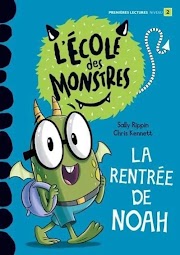Lesson with "aller" in the present tense
Need to review the verb "aller" with your middle school French students but want some context rather than just a grammar lesson? I found this funky 3 minute YouTube clip - a silent film! - which could be really interesting to incorporate.
To use something like this in class, students need a specific task during the viewing. For example, I would ask students to try to determine how to say "go" in French before sharing the video in class, (with a reminder to keep this to themselves rather than calling it out aloud).
Either stop the video about 70 seconds in, when they ought to have the answer and give them a new focus then, or assign them two tasks at once if you think your learners can handle it. (I would personally prefer to accomplish the two tasks at once which will allow for a more authentic, uninterupted viewing experience.)
Ask students to make comparisons between modern cars & driving and what they see in the video. They may notice things like no roof (or a collapsible one only). no apparent seat belts.
Some possible questions for post-viewing:
"de Charybde en Scylla" - This is an expression that means basically "from bad to worse" A common English idiom that is similar would be"from the frying pan into the fire." The actual French expression refers to two monsters from Greek mythology.
My notes for answers:
Personnages: M. Bouchu, Mme Bouchu et leur fils. Aussi il y en a un policier.
Entertainment was clearly very different 100 years ago. Baby film actors not as common in 1920s! Audience expectations related to "reality" have changed a lot.
Les Bouchu - no "s" at the end of the family name, whereas in English we do either add an "s" or refer to "the Aiello family" as a unit, which would take the second person singular verb form (like "elle" which would be the subject pronoun to replace it).
This is a great chance for your students whose first language is something other than English or French to make connections to their mother tongue and to share their thoughts with the class if they wish! Encourage them to be proud of their own experiences and connections they make in their learning.
Have a great week!
https://www.youtube.com/watch?v=v9uaX7fO_mQ
Either stop the video about 70 seconds in, when they ought to have the answer and give them a new focus then, or assign them two tasks at once if you think your learners can handle it. (I would personally prefer to accomplish the two tasks at once which will allow for a more authentic, uninterupted viewing experience.)
Ask students to make comparisons between modern cars & driving and what they see in the video. They may notice things like no roof (or a collapsible one only). no apparent seat belts.
Some possible questions for post-viewing:
- Qui sont les personnages dans le film?
- L'enfant n'est pas un "bébé". Explique cette manque de cohérence.
- Comment est-ce qu'on fait référence à une famille en français? Quelle est la différence comparé avec l'anglais (ou ta langue maternelle)?
(Scroll down towards the end of the blog post to see the "answer key" I would use... obviously discussions can take different directions, but it's still good to have an idea of what you might like to elicit.)
"de Charybde en Scylla" - This is an expression that means basically "from bad to worse" A common English idiom that is similar would be"from the frying pan into the fire." The actual French expression refers to two monsters from Greek mythology.
| Scylla & Charybdis - courtesy of Wikimedia Commons |
My notes for answers:
Personnages: M. Bouchu, Mme Bouchu et leur fils. Aussi il y en a un policier.
Entertainment was clearly very different 100 years ago. Baby film actors not as common in 1920s! Audience expectations related to "reality" have changed a lot.
Les Bouchu - no "s" at the end of the family name, whereas in English we do either add an "s" or refer to "the Aiello family" as a unit, which would take the second person singular verb form (like "elle" which would be the subject pronoun to replace it).
This is a great chance for your students whose first language is something other than English or French to make connections to their mother tongue and to share their thoughts with the class if they wish! Encourage them to be proud of their own experiences and connections they make in their learning.
Have a great week!








